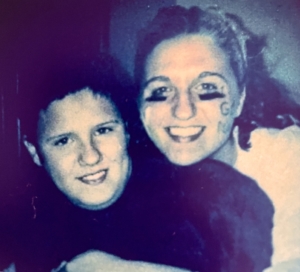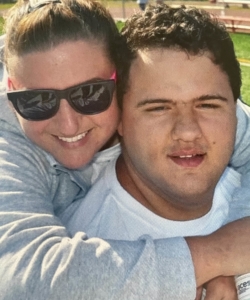Part Two: For Jud, Chris, and Millions of People With Disabilities – a Bill 70 Years in the Making Has Arrived
By Nicole Jorwic, Senior Director of Public Policy, The Arc
As we rally around the Home and Community-Based Services Access Act (HAA), a new bill in Congress that will transform how people with intellectual and developmental disabilities live their lives, it’s siblings like Nicole and Chris Jorwic that lead with the passion to make this change a reality.
In the second installment of our two-part blog series, The Arc’s Senior Director of Public Policy Nicole Jorwic shares what drives her passion.
 Nicole: Like Marty, my work is also rooted in my love for my brother and our joint passion to ensure that everyone has access to the supports that they need. My brother Chris is 31 and receives Medicaid HCBS services in Illinois. Even though he was born decades after Jud, with a lot more options and opportunities, my family has had to fight hard for inclusion in the classroom and for the services that he needs. But it is never far from my mind how different his life could have looked if we were from a different generation. Chris certainly could have ended up in an institution, a risk that still exists for my family.
Nicole: Like Marty, my work is also rooted in my love for my brother and our joint passion to ensure that everyone has access to the supports that they need. My brother Chris is 31 and receives Medicaid HCBS services in Illinois. Even though he was born decades after Jud, with a lot more options and opportunities, my family has had to fight hard for inclusion in the classroom and for the services that he needs. But it is never far from my mind how different his life could have looked if we were from a different generation. Chris certainly could have ended up in an institution, a risk that still exists for my family.
Why is that still a possibility? Because those institutions are still open in 2020. 36 states still have institutions (sometimes called state schools, state-operated developmental centers, or training centers) where people with IDD live segregated lives away from their families and communities. While media has shined a spotlight over the years on the atrocities that exist behind these walls, our society still tolerates their existence and the placement of people with disabilities in these inhumane places. The pandemic has caused grave danger to people stuck in institutions, but even before COVID-19, other dangers lurked in these dark places.
We must do better and expand access to home and community-based services because they are what people with disabilities and their families want and need. Those services have been a saving grace for Chris and our whole family. The inclusion in the community that these services afford to Chris is the same thing that my parents have been fighting for Chris’ since he was in school, and what drives Chris in his own advocacy work to ensure that his “brothers and sisters in disability” have access to what they need.

Chris has also had times when he didn’t have the services that he needed, when my darkest fears were around what if we can’t find what he needs. Those times were extremely difficult for our whole family, but mostly for Chris, because it left him stuck at home, with nowhere to go, and no way to use his voice, leading to very low moments.
Chris was facing a low time back in 2017, when The Arc network was fighting so hard to protect access to Medicaid HCBS. The huge Medicaid cuts proposed in Congress would have disproportionately impacted HCBS because they’re “optional” services and states don’t have to cover them. States do have to cover institutional services and I knew that cuts to Medicaid would mean fewer HCBS and more people like my brother being forced into institutions. While I worked in Washington on the policy threats, I would call home and hear the sounds of Chris having a rough day without the services he needed. I would take those moments when I was close to tears because I shared my brother’s frustration, and turn it into fuel to keep going, something I know Marty and others before me have done. It reminded me why the push to protect Medicaid was so important, but also how much progress we still need to make.
I knew what we needed to do not only from my personal experience but also from my experience working for the state of Illinois, a state with over 20,000 people on the waiting list for HCBS and 7 institutions. It’s even more clear now, after the fights in 2017 and the COVID-19 pandemic, that the only way to truly transform the old system, to close the institutions that still exist, and end the waiting lists that almost a million families are stuck on across the country is to address this issue head-on. Requiring Medicaid to cover HCBS has been a driving focus of my work since I joined The Arc.
So, when the attacks on Medicaid subsided in 2018, we turned our focus towards that goal. We worked hard to get coverage for HCBS into the universal health care proposals—something that hadn’t happened before it finally did in 2018. And then we pivoted specifically to the issue of requiring Medicaid to cover HCBS. We were lucky to have champions on Capitol Hill like Representative Debbie Dingell and Senator Maggie Hassan who both understand this issue personally, and we appreciate their leadership and openness to working with us to get this right.
And we’ve gotten it right with the HAA. The dreams of our families and our founders and much of what we have fought for as volunteers and staff at The Arc would become reality.
We need this bill to pass now. In Illinois in April, the National Guard was called into two of the state institutions because too many staff and residents had been diagnosed with COVID-19. People with intellectual and developmental disabilities have been infected and died at higher rates. And every person with a disability and their friends, family, and staff have had their lives turned upside down. This bill would ensure that we have the infrastructure to at a minimum protect people from this kind of public health threat, but also give people the services to thrive, and not just survive.
The work we will do over the coming months, and possibly years, to get to the passage of the HAA will certainly be some of the most important in The Arc’s 70-year history. We will fight because the investment in HCBS is what we need to fully realize our mission, for Jud and for Chris and all the people with disabilities who want a full life in their homes and communities.
Get involved in this effort with me and Chris. Sign up to take action with The Arc, and tell your members of Congress why this bill matters.








